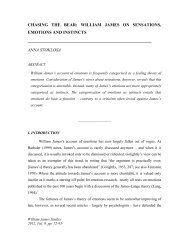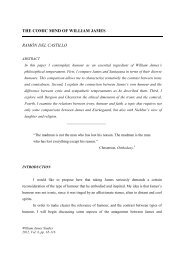POLITICS IN THE PLURIVERSE. By Kennan Ferguson
POLITICS IN THE PLURIVERSE. By Kennan Ferguson
POLITICS IN THE PLURIVERSE. By Kennan Ferguson
Create successful ePaper yourself
Turn your PDF publications into a flip-book with our unique Google optimized e-Paper software.
REVIEWS 136<br />
Any pluralist, statist, liberal, pragmatist, or Jamesian who cares about these<br />
important matters will benefit from the questions <strong>Ferguson</strong>’s book raises as well as the<br />
answers it proposes. This book further repays reading in that it offers interventions into<br />
other debates of interest to we who read, interpret, and love the work of William James. I<br />
have here focused almost exclusively on <strong>Ferguson</strong>’s centermost themes of the pluralism<br />
made available by James, but there are indeed other worthy topics broached in these<br />
pages. One is the interconnection between James’s philosophy and politics in terms of<br />
his recpriocal pluralism and anti-imperialism (Chapter Three). Another is the Jamesian<br />
pluralization of the role of sovereignty in international affairs (Chapter Three). Another<br />
theme engaged with particular ability in the book concerns the relation between<br />
Pragmatist and Continental Philosophy as anticipated by the invigorating interchange<br />
between William James and Henri Bergson at the beginning of the twentieth century<br />
(Chapter Four). As this last issue has gained some interest in recent scholarship, I will<br />
conclude with a brief consideration of <strong>Ferguson</strong>’s treatment here.<br />
<strong>Ferguson</strong> aims to contest the familiar narrative that recent American ‘theory’<br />
takes its antifoundationalist aspirations over from French ‘postmodern’ thought. He<br />
favors an alternative narrative according to which French pomo-ism is itself a borrowing<br />
from an earlier iteration of American pragmatism-cum-pluralism. The birth of<br />
antifoundationalism in recent intellectual discourse is thus actually a rebirth of an<br />
originally American, or at least originally Jamesian, contribution. <strong>Ferguson</strong> uses the<br />
interchange between James and Bergson to make his point. He concludes that, “The<br />
connections between the two thinkers, their mutually constituted recognition that truth<br />
and thought often have lacunae between them, echo throughout the century that followed<br />
them” (61). But in tracing this mutual influence <strong>Ferguson</strong> moves much too quickly to<br />
satisfy the intellectual historian. He also neglects the work of other intellectual historians<br />
on related matters, most notably Chapter Three of James Livingston’s Pragmatism,<br />
Feminism, and Democracy (Routledge: 2001).<br />
The lines of influence between James and Bergson which <strong>Ferguson</strong> traces should,<br />
he concludes, serve as cautions against interpretations of philosophy that are<br />
“intrinsically ahistorical” such that they “reinforce boundary disputes within philosophy<br />
rather than investigate what seemingly difference branches can say to one another” (64).




